#takes the world building of dungeon meshi
Explore tagged Tumblr posts
Note
your desert duo dungeon meshi art (stunning btw) has made me realize I have absolutely no concept of what that manga is even about... at this point i'm scared to find out
just about cookin yummy food in a dungeon absolutely nothing to worry about :]
#also the au is more like#takes the world building of dungeon meshi#characters arent replacing each other#though there may still be general like#world building spoilers?#so i may still have to tag anything important like that with dungeon meshi spoilers#struda responds
106 notes
·
View notes
Text
as a black dungeon meshi fan, it's really interesting to me how quickly some reactors immediately take marcille's side in the argument against the orc chief. like i understand why, considering the way we meet them, but it feels so highly intentional. like cheering on marcille for standing up against the orc chief "because the orcs probably started it in the first place!" but ignoring how quickly chilchuck and laios balk once it's brought up? that wasn't fear of their captors, that was very blatantly guilt.
even when marcille, an elf (a proud people, according to world building and general dnd consensus), talks back, she says "I remember your people doing your fair share of killing too". not "first", "too". if the orcs started it, im POSITIVE she would have said as much then. And I can't really blame the reactors because most of them are anime-onlys, so they don't know the reputation elves have in canon, but its just wild to me, considering all thats going on rn and frankly historically, to see a very blatant racial allegory and immediately side with the fair skinned blonde woman without even pausing to consider why the orcs are in this position. even AFTER they've explained that theyre desperate and being pushed to the edge.
#dungeon meshi#delicious in dungeon#only fandom content im gonna make rn for boycott reasons but it just feels relevant#to see characters accused of barbarism even after theyve explained that they were pushed out of their land and into the dungeons#“theyre biased. they could be lying!” and marcille couldnt be?#of course theyre wary and rough. their life depends on it.
2K notes
·
View notes
Text
Ryoko Kui is freakin hilarious, because she gives everyone in Dungeon Meshi all these personal internalized biases and forms of racism none of the characters ever think about for themselves because they're so used to those biases that they don't recognize them as forms of bigotry. And it's really cool, because through the lens of fantasy it's relatively easy for a reader to have enough distance and perspective to understand how all of the characters, whether protagonists or antagonists, experience these biases. It's a nice piece of world building that doesn't take away from the story if you happen to miss it, but adds a lot once you begin to pick up on it.
Then she introduces Kabru, a dark skinned protagonist, to readers who are in their vast majority from counties with a large amount of baking in racism towards darker skin, and is like okay now you the reader are invited to be a part of experiencing your own internalized biases and to become a part of this theme of unconscious bias subtly or overtly misdirecting how people understand each other. I think it's very funny of her to drop that in there and see how many of us self reflect about it. And of course he's just as much part of the story and plot, so we don't have to do any of that or even notice it, but it's a more enriching experience if we do.
809 notes
·
View notes
Text

Seeing the dungeon meshi race swap going around and got to thinking, how would Aldiirn be if he was born full drow or full human instead of half & half. Bit of rambling under the cut!
For full drow he’d have skin/eye colour more in line with his house and a much slimmer build with a face more like in-game. His upbringing would be similar aside from better treatment as a drow. Instead of a traumatic exit from lolthite society he’s scouted and converted to Vhaeraun. He’s less neurotic, his morality ends up more neutral-leaning, and he is loathe to go to the surface. He still works tirelessly to see Lolth overthrown and the Underdark united.
Human Aldiirn would be an ENTIRELY different person, especially if raised on the surface - it was only after drawing I realised he could be raised as a slave to drow if I wanted to keep that connection. Has a broader and taller build that canon Aldiirn takes after.
Def all goes to show how being half-drow affected him, leading to the scar, extra determination to make the Underdark a place for all, and career out of running deliveries between Upper Dark and World Above. No matter what lineage he’d have decent charisma but specific half-drow experiences are what lead to it shooting through the roof. Drowdiirn would be a Cleric and Humandiirn might not be an adventurer at all.
The alt hairstyles were ones I considered when creating Aldiirn in-game, I ultimately settled on eclipse because of how it interacted with the scar.
515 notes
·
View notes
Text
Real World Cultural and Linguistic Influences in Delicious in Dungeon (NON-FICTION)
It's here! It's finally here!
Well, chapters 1-7, the first 98 pages (52,837 words) of the essay are done! This covers what the essay is about, my methodology, translation issues, the Dungeon Meshi world in general, and the names and cultural references relevant to all of the Tall-man characters. More will be coming soon. SUMMARY: Dungeon Meshi is full of vivid and complex world-building. When you take all the information in the manga as a whole, there are clear and consistent patterns in what real world cultures the author was inspired by, and how she arranges them on the Dungeon Meshi world map.
In this essay, I will catalog and explain every real world cultural reference I was able to identify in the manga, including character and location names, historical and mythological references, clothing, and of course food!
WARNING: This essay is full of spoilers for the entire Dungeon Meshi manga, all the extra materials, and the anime. Disturbing and violent moments that happen in the series are described, discussed and analyzed. The essay also discusses real-life world history and mythology, which contains sensitive subjects like war, death, slavery, abortion, child killing, sexual assault, incest, and bestiality. These topics are mentioned in an academic context, and not described. Please proceed with caution if this concerns you.
READ IT ON ARCHIVE OF OUR OWN
#dungeon meshi#delicious in dungeon#Laios Touden#Falin Touden#Marcille Donato#Kabru of Utaya#Kabru#Rinsha Fana#Thistle (dungeon meshi)#Thistle Merini#Yaad Merini#Delgal Merini#The Winged Lion#Toshiro Nakamoto#Maizuru#Hien#Benichidori#Inutade#Izutsumi#The Essay
531 notes
·
View notes
Text
Rip Damian Al Ghul Wayne, you would’ve loved Dungeon Meshi.
I imagine Maps gets him into it. It’s doesn’t take a lot of convincing since they already have a dnd (or whatever dc’s equivalent is) campaign with Jon, Maya, Kathy, and Colin. Damian prefers to read physical copies so he orders a box set and binges it one night.
His favourite character is probably Chilchuck. I think that he relates to not being treated seriously, especially because he’s yet to grow out of his baby face. He also finds him the most reasonable out of the group, which he appreciates.
He is a huge Farcille fan. He is kinda mad that they never got together at the end, but he does have an ao3 account so…
He really appreciates the world building. He especially likes how all the races have different and unique features. I think he’s already planning a campaign set in the world of Dungeon Meshi.
#shut up spicy#me smashing two of my favourite media’s together#now kiss#batman#dc comics#batman comics#damian wayne#dc#batman dc#dungeon meshi#delicious in dungeon#damian al ghul#damian wayne al ghul#damian al ghul wayne#Mia maps mizoguchi#maps mizoguchi#mia mizoguchi
254 notes
·
View notes
Text
I’ve never seen fans of something fight as hard to preserve the dignity and essence of the source material of anything as hard as Dungeon Meshi fans have these last few months. Straight up belting analysis after analysis that corrects the shallow takes of animeonlys and otherwise hordes of people that have a clinical need to reduce characters to palatable fandom tropes and to ignore very present and rich world building.
257 notes
·
View notes
Text
One world and character building aspect of Dungeon Meshi that I really like is the way it explores different race life spans. Like, we see elves in media as being the quintessential long-lived race, the race that has a tendency to outlive everyone else and therefore has a habit of infantalizing other races. Dungeon Meshi certainly explores this.
But the other less talked about aspect of this long life is the fact that elves take longer to mature, and as a result, an elf child seemingly stays stagnant compared to their shorter-lived peers. We see this explored especially with Thistle. He was raised in a tallman court, and outlives his enslaver/ father figure. He would have outlived his brother figure too, if not for the power of the dungeon. He was a child who was perpetually exploited for generations worth of time. We also see it with Marcille, though hers is a special case of growing erratically on top of growing slowly. In both cases, they struggle with relating to their peers because their peers surpass them far too quickly.
The elves are isolated and typically only associate with other elves, but how can you expect them to fully relate to and integrate into a social system that constantly passes them by? It's hard enough to keep in touch with childhood friends when everyone grows up, goes out into the world and builds their own family and life. Imagine all of your friends getting jobs, getting married, having kids and grandkids, retiring, and dying all before you hit puberty. How profoundly lonely would that be?
166 notes
·
View notes
Text
I want to talk about the latest Doctor Who episode looking at monoculture and worldbuilding and how it adds fantastically to the whole episode.
I knew about the twist in the episode before I went into it, so I have less to say about how the racism shocked me and more about the society they function in.
As I mentioned in a previous post, none of them experience the world around them- pretty much at all.
I watched Lindy walk to work and I thought to myself "is that their gardens? They never stop to look at them?" Maicured grass with decorative shrubs- not only is the grass itself a symbol or capitalism and class systems, but it's perfectly kept and that's pretty much all the biodiversity you see.
It's a monoculture, it's not hospitable to insects, and it reveals more about the planet to you. It's not hospitable to insects because they aren't meant to live there. There probably even aren't any, thanks to the forcefields around the city. They may be seen as pests, but they're absolutely vital to an ecosystem. It makes me imagine that even the dirt housing the grass is likely free of microfauna- meaning some other technological intervention is taking place to make the grass stay green- it might not even be real. Which implies nothing can grow.
Also note you also don't see any pets.
Additionally, the doctor that pops up on Lindy's screen notes she doesn't need to urinate. Sure it's just a silly joke about how when she gets scared she suddenly does need to. But it tells you:
1) That is seen as a good thing, having to pee is seen as an inconvenience or maybe a social faux pas
2) If she doesn't need to pee, she doesn't need to drink. If she doesn't need to drink, she doesn't need to eat either
And if she doesn't need to eat, she probably doesn't, and she almost definitely never cooks either. I'll say it a million times- as will Dungeon Meshi as it's surged in popularity: you need to eat to be alive and, in fact, being alive is all about being able to eat- finding balance and enjoyment and sharing experiences and staying alive. It's a celebration of who you are and where you came from and how good it is to still be alive. And in their society- it's just gone.
Everyone dresses so similarly and even acts similarly. Everyone dresses in clean cut clothing and pastels- even those who have more eccentric styling or hair, they fit into this world and it's not commented on. The most diversity they have is Goth Paul and even he doesn't dress fully in black- he has an almost pastel purple in his hair. So even with those "different" they're actually quite similar
(Thinking about it. Did anyone in that episode have curly hair besides the Doctor...?)
And it all leads back to monoculture. Even think about how everyone in the city is the same sort of demographic: 17-27, rich, white. Likely also able bodied and neurotypical. Nothing can live or thrive in a monoculture, no one can or will change, and so they stagnate- as does the world around them.
People become more accepting and open and kind when they try new experiences and meet new people, by expanding their worlds, they become more tolerant- but this is a world in which that can never happen. Even Ricky September, who turns off his bubble, stays inside to read. He never goes out, never tries anything- so not even he would have the capacity to change, truly.
Knowledge is such a powerful tool as well as being open to outside influences and change. By living with people who are the same, they can never take on the wisdom of their elders, and by living in a monoculture, their fashion will never change, they will never try new food, they will never appreciate new growth on plants or learn to take care of pets.
They can never change or grow. And the racism building their society has ensured that. They will never learn empathy, because they will never interact with different races and are taught to be disgusted by them. They will never be able to experience the joys of those cultures either, not that they deserve them, they won't pick up new fashion or recipes or dance or music. And from their point of view, they never want to.
Experiencing the world will teach you much more than books ever could. Ricky September showed bravery and empathy from his limited freedom, much more than Lindy was capable of. But he would still be racist if it came down to it, because why would he be otherwise?
This is their perfect society: nothing can live there and nothing ever will. And thanks to it, not one of them will survive.
#long post#worldbuilding#doctor who spoilers#15th doctor#dw spoilers#doctor who#dot and bubble#lindy pepper bean#ricky september#ncuti gatwa
192 notes
·
View notes
Text
alright, i just got around to finishing Dungeon Meshi- and damn if it didn't stick the landing!
there's a lot to recommend in this manga. first- it's extraordinarily fucking funny. it does not forget that it's a comic, and consistently has great visual gags even when something deeply fucked up and serious is happening.

and it fires on all other cylinders, too- the character designs are great, the worldbuilding is intricate and believable and does a lot of interesting things with standard fantasy tropes, the main cast is likable and has a great dynamic, the story keeps a lot of plates spinning without getting up its own ass or forgetting the details...
but the thing that really impresses me about Dungeon Meshi- the thing that sticks out as something it does uniquely well- is the theming.
Dungeon Meshi is about hunger and eating. it is about those things, hardcore. just about every plot point and every character dynamic is about that theme, approached from a dazzling array of different angles. it's got plenty to say about like, actual food and cooking, sure- but it also gets into the nature of desire, the cycle of predation, differing personal tastes, taking the other into oneself, satiation vs motivation... it makes sure that every development in the story is grounded in and building on that theme somehow.
Food is not a gimmick- Food is what the story is about, and not as a bit. this isn't a silly food-world full of food-creatures and food-magic- this is a normal, well-developed fantasy setting, in which a story is being told that focuses relentlessly on the relationship of the characters to food and eating. it manages to feel completely natural, even with so much going on that you'd think the food thing would get in the way. it doesn't get in the way. the story was designed around it, down to the smallest detail.
i think it might be a 10/10 manga! it does everything it sets out to do, completely successfully, with a ton of humor and charm. well-paced, well-drawn, well-written, good ending- i can't think of anything to complain about. highly recommended.
#manga rec#dungeon meshi#(okay that's not true i can think of one thing to complain about but it's just my personal pet peeve#there's some wouldn't-it-suck-to-live-forever acceptance-of-death stuff in there that bugs me#but it's pretty reasonable about it#marcille's life extension thing is portrayed as sensible and sympathetic#and the whole story is a quest to bring someone back from the dead#it can't resist the usual platitudes but it's not completely stupid about it)
211 notes
·
View notes
Text
His Majesty the Worm
its wormin' time Genre: Dark(?) Fantasy, Dungeon Crawler, OSR
Touchstones: Classic TTRPGs, Dungeon Meshi
What is this game?: His Majesty the Worm is a Tarot-Based game that aims to take all the boring parts of OSR and make them into goofy and fun features
How's the gameplay?: Hoo boy, this is gonna be a dense one His Majesty the Worm takes on a Maximalist approach to game design, with many sub-mechanics affecting your overall performance, the core game's mechanic is using Tarot instead of Dice for randomization, while a Tarot deck (w/ minor arcana) is recommended, the game is designed so a standard 52 card deck could also work, albeit not recommended. Whenever a character needs to do something a TEST OF FATE starts, characters have stats based on the Arcana's suits, Wands, Pentacles, Cups, and Swords, and whenever a TEST OF FATE starts, they draw a card from the Minor Arcana deck, then add that stat to the number they drew (Face cards are 11-14, Fool is a 0). Characters have a choice between 4 paths (also corresponding to the Suits in a minor arcana deck), a Kith (species), and a Motif (a quick sum up for your character), if I wanted to play a crotchety wizard asshole I would play a Path of Wands character with the Motif "Grumpy Scholar" and the Kith Underfolk, since my wizard is a halfling. The game is split between two distinct phases, Crawling and Citying, The crawling phase is going into the megadungeon and looking around for loot, while the City phase is going into town and buying shit! This game really focuses down on the minor, mundane parts of adventuring, Food management, Managing what you're currently holding, Torch supplying, Equipment Upkeep, and Weight management are all vital parts of a character, this might sound boring, and in any other game it'd be! BUT his Majesty the Worm is built entirely around these granular, seemingly inconsequential mechanics, they feel warranted and fun. The game also has an in-depth Guild building mechanic, after paying the 50% tax that all adventurers must pay to enter town, you gotta use up all that gold from dungeons somewhere! and the best place to put it in is equipment, but second place is helping out your community by starting an adventurer's guild! By investing your hard earned gold into your community you can build many things! like Taverns, Unflattering statues of your rival guildmasters, Monasteries, and other such fun things! This isn't even getting into things like Sorcery and Alchemy and how those end up mattering, Status effects, Language management being a part of gameplay… His Majesty is a maximalist game in every way, but it knows how to blend all of its strange and seemingly menial mechanics to make a very fun experience, it takes some of the most unfun games in the market and goes "Ok but what if it worked?"
What's the setting (If any) like?: Uhhhh, there's a setting alright! It shows up in bits and pieces of flavor text and the like, but there doesn't seem to be a setting guide or anything, the setting is fairly malleable, but a general dark fantasy vibe is the norm, the game explicitly says its not supposed to have a set in bedrock setting
What's the tone?: Goofy Dark Fantasy, its a grim world, but its also silly and pokes fun at tropes of the genre as well as just has copious amounts of poop jokes, its not a game to be taken seriously tonally speaking
Session length: 4 hours minimum, this is a complex game
Number of Players: 5 is my recommendation, 1 gm and 1 player of each path
Malleability: Very malleable! its an explicit design goal!
Resources: The game's website has many resources available, including an online tarot deck, player sheets, and a guild sheet
I really didn't think I'd like this game that much! it's an extremely well made and well thought out look at the OSR genre, if we keep getting OSR game I hope they look more like His Majesty
45 notes
·
View notes
Text
“How do describe a Dungeon… Imagine for a moment that you are sitting in your abode minding your own business when a small spider appears crawling on your floor. How do you respond? Do you watch it curiously? Do you let it explore your house as a fellow resident? Do you take it outside? Do you pick it up and admire it? Do you instinctively squash it? Do you chase it with a broom? Do you capture it as a pet? Consider, in this analogy you are the spider and the dungeon is both the denisen and the house itself.
If you ever find yourself within the bounds of a dungeon, never forget that you are both a guest and a trespasser, and that the dungeon’s tolerance of your presence may shift on a dime.” -unknown
This is a peak at some world building from my trrpg. In Tales from the Aether, Dungeons are very rare living things and pocket dimensions of a sort. I was inspired by Dungeon Meshi’s dungeons and took it a step further haha There are other twists surrounding Dungeons but I want to leave some mystique around them for now hehehe
This is just a taste of TftA’s lore and if you like it, give a follow to support the project!
142 notes
·
View notes
Text
Winter 2024 Anime Overview: Dungeon Meshi (Delicious in Dungeon)

Premise: Laios is the leader of an adventuring party, and his sister, Falin, got eaten by a dragon while sacrificing herself to save the team. Fortunately, in the dungeon they were exploring, people can be resurrected with magic. Unfortunately, if the dragon fully digests Falin, they probably can’t resurrect her. They have no time to resupply and must traverse many levels of the dungeon filled with monsters to find the dragon. Laios declares that since they can’t get food, they’ll eat the monsters in the dungeon instead-- and as a huge monster fanatic. he's unsettlingly excited about this. He’s accompanied by elf mage Marcille and hafling rogue Chilchuck in his quest, who are much more reluctant about monster-eating. They run into a dwarf, Senshi, who is an expert at cooking monsters, and the delicious race against time to save Falin begins!
...Oh what the hell, I'll say it. FINALLY, some good fucking food.
Memes aside, I love this story so much that writing a review of Delicious in Dungeon/Dungeon Meshi is daunting, because I really want to get across how great it is. But are there enough words in the English language to convey this? We can only try.
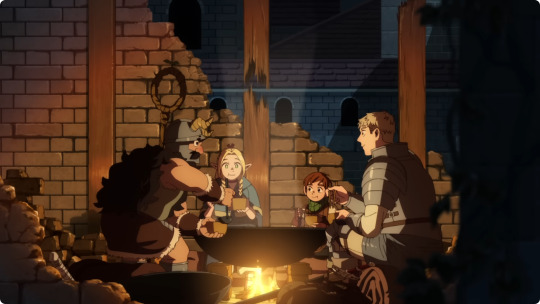
Dungeon Meshi combines cooking and adventure animanga expertly, humorously treating eating monsters with the complexity of actual recipes (and indeed, the recipes for the monsters are based off real life recipes). You can experience the warmth and contentment of sharing a meal and enjoy the way the story goes in depth about the biology of the monsters and ecology of classic RPG style dungeon. But at the same time these characters are on a classic fantasy quest and there’s lot’s of excitement as they work together overcome monsters, obstacles and their own weaknesses to save Falin.
The first thing that stands out about Dungeon Meshi is that it’s immediately entertaining and funny. A lot of humor is mined out of Marcille’s complete disgust at eating monsters (and Chilchuck’s more measured reluctance) contrasted with Laios and Senshi’s bizarre enthusiasm for it. The face game of the series is on point, especially Marcille’s.
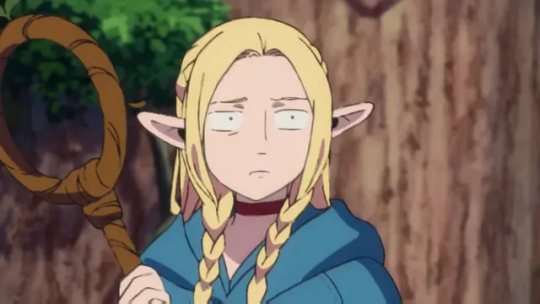
The characters play off each other very well, have a hilarious dynamic and tons of quirks. They're immediately lovable. They're eccentric weirdos who push each other's buttons, misfits who just happen to fit together, and that's always the best.
I've seen some first time anime viewers complained about that how the early episodes are supposed to be race to save Falin, but there isn't much urgency as the characters have adventures and meals on the way. I can see that as a criticism (though it didn’t stick out to me much in the manga) but this is because we’re mostly seeing them in between the times they’re traveling, when they need downtime and mealtime. The fact that people should never neglect eating and rest if they want to succeed is a pretty important message of the show. You’ve got to let the series cook (forgive the pun). As it goes on, the urgency and tension increases ramps way up. the plot truly takes form and we see a lot of the world building from early parts pay off.

Phenomenal, intricate worldbuilding is the next big thing that stands out about Dunmeshi. Any viewers paying attention will notice it pretty quickly. Ryoko Kui doesn’t dump her complex world or her character’s detailed backstories on the viewer all at once, instead she lets it unfold bit by bit, so the viewer/reader can watch the world expand as the journey goes on, as if we are truly living this world and exploring it along with the characters.
Everything is carefully thought out, from the structure of the societies, the cultural nuances and physiology of the different magical races, the conflicts between said races and the ways they integrate, the ecosystem and the different monsters and how they function…I could go on forever. And best of all, Dunmeshi's worldbuilding is never to the detriment of it’s incredibly rich story and characters, all of which are also developed wonderfully.
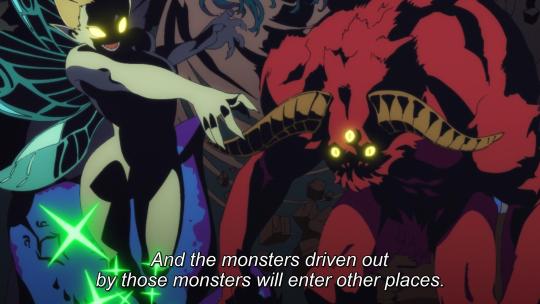
After all, Dugeon Meshi isn’t simply a story about making food and eating monsters—it’s about the ways we consume and ARE consumed, it’s about the endless cycle of life and death and the pain of struggling against that cycle. It’s about the endless hunger that drives us all and the ways we try to fill ourselves up. It’s about the ways we can find both solace and terror in the monstrous, about our struggle to accept not just monsters, but anyone who's different from us. It’s not just about natural ecosystems, but social and societal ecosystems and the ways they both hurt and help us. It’s about all the things that make good meal, one that can draw people together and help us find essential humanity that connects us.
These strong themes are all expressed through the world and the journeys of the characters. And god, do I love these characters.
Even from the start, the characters overturn RPG/fantasy archetypes. (We have an elf who’s not that into nature and dwarf who LOVES nature and doesn’t like blacksmithing)… but the most special thing about these characters is how they deepen, becoming more and more complex and fascinating as the series unfolds. None of them are quite who you think they are while also being exactly how they appear.

Marcille is one of my favorite characters in anything ever. She’s just an absolute disaster, while also being terrifyingly powerful. She’s a magic honors student who buried herself in theory but doesn’t have a lot of experience with the real world and gets upset it doesn’t work like school (I feel that). Her pride and generally high strung nature can lead to blunders that make her very funny to watch. She’s a total nerd in a way that’s so relatable, she has intelligence in spades, but not a lot of wisdom.
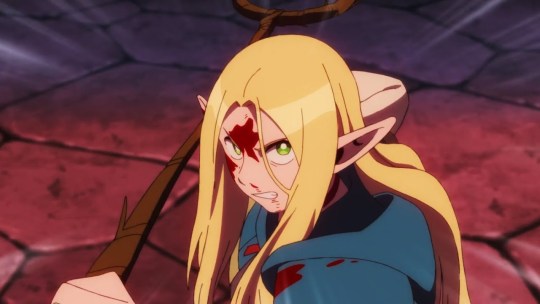
But on the other hand, she’s an aching wounded soul who’s struggling under the surface, dealing with grief and loss constantly. She's obsessed with control in a world that uncontrollable. She’s incredibly driven and unnervingly dedicated to her goals. She’s also scarily devoted to the people she loves and will cross any moral line, break any taboo, and cover herself in blood and sin to save them. She refuses to let silly things like “laws” and “rules” stifle her research or get in her way .And while she's a neat freak who's grossed out by monsters, she's the first person to dive into the blood and guts and horror when shit gets real.
The contrast between her being a sweet, silly, dorky lovable nerd who flails around and being a powerful badass who has complex motivations, an intricate arc, and sometimes questionable morals is so great. Get you a girl who can do both. She's basically everything I love in a character.
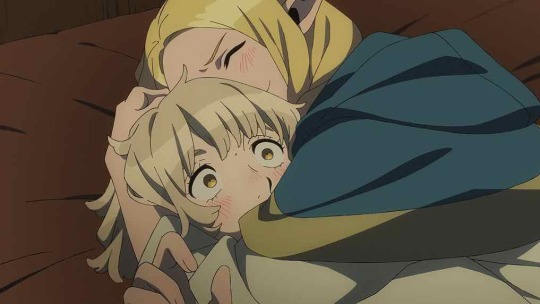
Marcille’s love for Falin and infinite devotion is also key to the story, and it’s so refreshing to see a well-written relationship between women be so central to a fantasy anime like this. And yes, by love for Falin, I mean in a gay way. It’s not technically canon (Dunmeshi is not into confirming romantic relationships for any of it’s characters really) but it’s hard to interpret their relationship as anything else, and honestly it’s one of the best wlw ships I’ve seen in a while. It’s got everything, the softness, the sweet and sensual intimacy, the angst, the tragedy, the raw unbearable yearning, tearing the world apart and defying even the laws of nature for her, crawling through hell and soaking your hands in blood and not letting anything get in your way...yeah, it’s good.
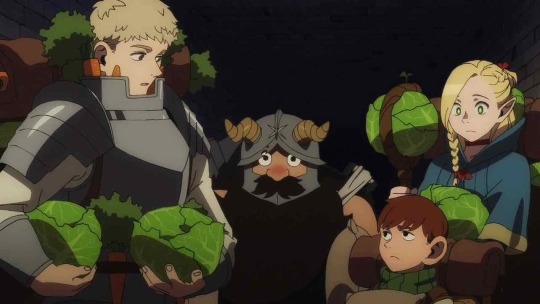
While Marcille is my #1, all the characters in this story are fantastic and I love them all. They all have incredible depth and similarly complex backstories and arcs, and are all fun to watch. For instance, Laios may look like generic human fighter but he’s just the weirdest dude, a wonderfully unhinged man who absolutely has a monstersona. But then we also discover he's someone who struggles socially in a way that many neurodivergent people can relate to, who had a troubled childhood, who grapples with survivor’s guilt, and who, like Marcille, would do anything for his sister and the people he cares about. Chilchuck and Senshi and Falin and all the others the same, really interesting characters who deepen and grow. Everyone's relationships also develop wonderfully.
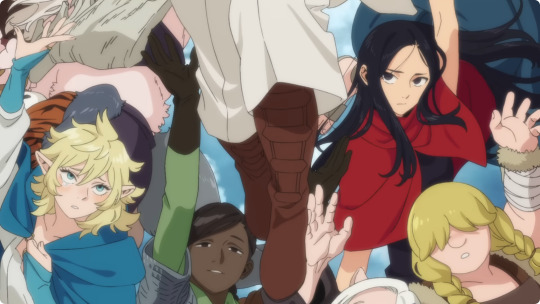
And on top of all that, it's a show with really well-realized and well-written female characters…who even have diverse body types! We have stocky dwarf ladies with muscles! Huge orc and oni women! They’re allowed to be messy and complicated, badass and vulnerable, and that’s definitely a part of my affection for the series. (and famously, most of the fanservice of the series is focused on Senshi’s endless pant shots (loincloth, if we’re being specific)) and while there are moments with the female characters that make me fan myself, it’s not the obnoxious anime unsexy bullshit way that treats women like objects.
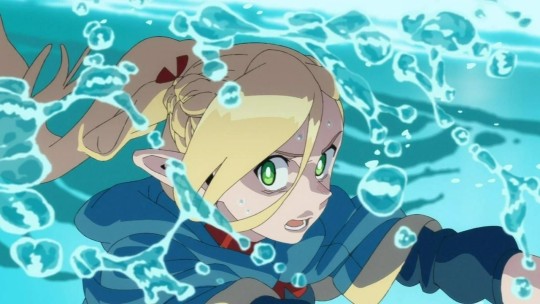
And specifically for the anime, Trigger is doing great work with it. There’s so much cool and vivid animation. There are some small moments from the manga that I really miss and wish they had kept, but it’s been a largely faithful adaptation that understands what makes the story great, and I can’t ask for much more. The English simuldub is also genuinely good with all of the VA’s turning in great performances (and Prozd plays Senshi!)
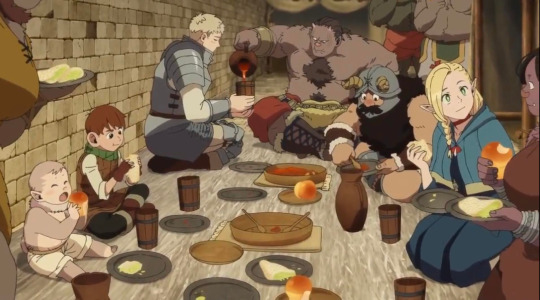
Dungeon Meshi is honestly one to the best stories in recent years, and it’s easy to let it take over your brain. So come along with me and enjoy the funny jokes, the splendid storytelling, the endearing and endlessly fascinating characters and the delectable world. You don’t want to miss out on this delicious meal.
#dungeon meshi#delicious in dungeon#anime overview#winter 2024 anime#marcille#marcille donato#laios touden#falin touden#anime#ryoko kui
122 notes
·
View notes
Text

WIP of Laios (and Kensuke <3)
feeling quite in prisoned right now. I cant stop adding more and more brush strokes, every time I try to take a brake man ;_;
BUT apart from my "taking a brake struggles" I'm adoring this painting so far and oh myyyy looooorddd i love Dungeon Meshi.
I hadn't actually intended to watch it :0 um VARY HAPPY I DID. It's become my fave anime, peak silliness and i love their character dynamics and the world building, It's so fun :-D
now i wanna read the manga \(ϋ)/
51 notes
·
View notes
Note
Laios Touden is an adorably awkward sod.
He's kind of average from my point of view; about 6' with a decent build, no facial hair, and a sweet face. He's no Nanami or Zoro but he's still definitely physically attractive, plus dude has to be strong by default because he's wearing a steel chest plate and fricking chain mail.
If you've never worn a chain mail shirt then you wouldn't understand but that shit is heavy as fuck and then he's got more armor on top of that. You can't be weak and wear armor, it just doesn't work out. And then to top all that off, he's strong enough to wield a sword while wearing all that heavy ass armor.
He may not be Conan the Barbarian buff, he's a more believable body type but definitely has good muscle mass. But he technically has an average build for a guy of his proportions.
Now, being the awkward fella that he is, you can't flirt your way with this one. You gotta hit him upside the head with your affection. If you don't like socially awkward but intelligent individuals, move along. I however, would get along great with him. As weird as he is about eating everything he encounters, I want to collect pieces of it.
He can kill and cook it, but I want some scales or feathers or bones from his prey. I like to collect rocks and twigs, and dry leaves and flowers. I'll just have a collection of stuff from every hallway, room, and creature encountered in the dungeon and I think he'd appreciate that.
He has harebrained ideas, I have harebrained ideas. We'd make the perfect team. He has no experience in the bedroom and I don't really either. We get to explore that together.
I think, as awkward as he is he'd be really careful and gentle with his partner. He has no clue what he's doing, so you take it slow. First you have to get past the embarrassment of stripping in front of each other and being that exposed to someone else. Maybe the difficulty could be lessened by helping each other undress, though he's on his own with the chest plate. I'm seriously afraid I'd mess the straps up and then it'd be unusable and then I get my king killed. He can strip that himself, but I'll help with the chain shirt onward.
Then, you work your way towards intimacy by exploring each other's bodies, together. Maybe he'd be nervous and you'd have to grab one of his hands and press it to your chest with little reassurances that it's okay to touch, that you want him to touch you. And vice versa.
Eventually the exploration turns to making out and making out will eventually turn into love making. And when you're finally comfortable, you can explore new positions together and everything else.
Laios feels like he'd be the safest partner to have because he's new to it and needs to be guided, but he wants to guide you too. Learn each other's turn-ons/offs together. Explore kinks together. Be weird together.
I find his awkwardness adorably endearing and maybe he'd find mine alluring. Who knows, but in my own headcanon world I'm just one delicious in deepthroat away from being queen.
Horny Jail's Anonymous Thirsties
Please remember this is a confessional series; you may interact however you like, but you must always maintain respectfulness and civility with the confessor.

I don't even know where to start with this one, but I have a feeling someone else in the Dungeon Meshi fandom will enjoy it
#hornyjailsanonymous#thirsty#laios touden#laios dungeon meshi#dungeon meshi#dunmeshi#delicious in dungeon#crimsonwarden#welcometothehornyjail
21 notes
·
View notes
Text
EXTERNAL INFLUENCES IN DUNGEON MESHI: INDIAN PHILOSOPHY
(SPOILERS FOR DUNGEON MESHI BELOW)
We know that Ryoko Kui spent considerable time at the beginning of working on Dungeon Meshi doing research and planning the series. Kui constantly references real world culture, history and mythology, but she also occasionally references real-world philosophy.
The story of Dungeon Meshi is full of philosophical questions about the joy and privilege of being alive, the inevitability of death and loss, the importance of taking care of yourself and your loved ones, and the purpose and true nature of desire. Kui explores these issues through the plot, the characters, and even the fundamental building blocks that make up her fictional fantasy world. Though it’s impossible to say without Kui making a statement on the issue, I believe Dungeon Meshi reflects many elements of ancient Indian philosophy and religion.
It’s possible that Kui just finds these ideas interesting to write about, but doesn’t have any personal affiliation with either religion, however I would not be at all surprised if I learned that Kui is a Buddhist, or has personal experience with Buddhism, since it’s one of the major religions in Japan.
I could write many essays trying to explain these extremely complex concepts, and I know that my understanding of them is imperfect, but I’ll do my best to explain them in as simple a way as possible to illustrate how these ideas may have influenced Kui’s work.
HINDUISM
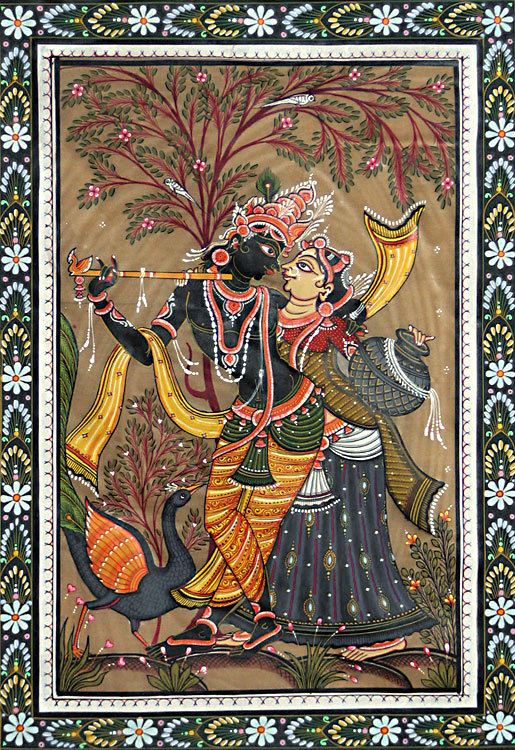
Hinduism is the third-largest religion in the world and originates in India. The term Hinduism is a huge umbrella that encompasses many diverse systems of thought, but they have some shared theological elements, and share many ancient texts and myths.
According to Classical Hindu belief, there are four core goals in human life, and they are the pursuit of dharma, artha, kama, and moksha.
Dharma is the natural order of the universe, and also one’s obligation to carry out their part in it. It is the pursuit and execution of one’s inherent nature and true calling, playing one’s role in the cosmic order.
Artha is the resources needed for an individual’s material well-being. A central premise of Hindu philosophy is that every person should live a joyous, pleasurable and fulfilling life, where every person's needs are acknowledged and fulfilled. A person's needs can only be fulfilled when sufficient means are available.
Kama is sensory, emotional, and aesthetic pleasure. Often misinterpreted to only mean “sexual desire”, kama is any kind of enjoyment derived from one or more of the five senses, including things like having sex, eating, listening to music, or admiring a painting. The pursuit of kama is considered an essential part of healthy human life, as long as it is in balance with the pursuit of the three other goals.
Moksha is peace, release, nirvana, and ultimate enlightenment. Moksha is freedom from ignorance through self-knowledge and true understanding of the universe, and the end of the inevitable suffering caused by the struggle of being alive. When one has reached true enlightenment, has nothing more to learn or understand about the universe, and has let go of all earthly desires, they have attained moksha, and they will not be reborn again. In Hinduism’s ancient texts, moksha is seen as achievable through the same techniques used to practice dharma, for example self-reflection and self-control. Moksha is sometimes described as self-discipline that is so perfect that it becomes unconscious behavior.
The core conflict of Hinduism is the eternal struggle between the material and immaterial world. It is often said that all of the material world is “an illusion,” and what this means is that all good and bad things will inevitably end, because the material world is finite. On the one hand, this is sad, because everything good in life will one day cease to exist, but on the other hand, this is reassuring, because all of the bad things will eventually end as well, and if one can accept this, they will be at peace.
The central debate of Hinduism is, which is more important: Satisfying your needs as a living thing, having a good life as a productive member of society, serving yourself, your family, and the world by participating in it the way nature intended? Or is it rejecting desire and attachment, discovering the true nature of existence, realizing the impermanence of material things, and that one can only escape the suffering that comes from the struggle of life by accepting that death and loss are inevitable?
There is no set answer to this question, and most believers of Hinduism tend to strike a balance between the two extremes simply because that’s what happens when a person leads a normal, average life, however there are also those who believe that pursuing extremes will lead to ultimate enlightenment and final release as well.
BUDDHISM
Buddhism is an Indian religion and philosophical tradition that originated in the 5th century BCE, based on teachings attributed to religious teacher the Buddha. It is the world's fourth-largest religion and though it began in India, it has spread throughout all of Asia and has played a major role in Asian culture and spirituality, eventually spreading to the West beginning in the 20th century.
Buddhism is partially derived from the same worldview and philosophical belief system as Hinduism, and the main difference is that the Buddha taught that there is a “middle way” that all people should strive to attain, and that the excesses of asceticism (total self-denial) or hedonism (total self-indulgence) practiced by some Hindus could not lead a person to moksha/enlightenment/release from suffering.
Buddhism teaches that the primary source of suffering in life is caused by misperception or ignorance of two truths; nothing is permanent, and there is no individual self.
Buddhists believe that dukkha (suffering) is an innate characteristic of life, and it is manifested in trying to “have” or “keep” things, due to fear of loss and suffering. Dukkha is caused by desire. Dukkha can be ended by ceasing to feel desire through achieving enlightenment and understanding that everything is a temporary illusion.
There are many, many other differences between Hinduism and Buddhism, but these elements are the ones that I think are most relevant to Kui’s work.
Extreme hedonism involves seeking sensual pleasure without any limits. This could just be indulging in what people would consider “normal” pleasures, like food, sex, drugs and the arts, but it can also involve doing things which are considered socially repugnant, either literally or by taking part in symbolic rituals that represent these acts. Some examples are holding religious meetings in forbidden places, consuming forbidden substances (including human flesh), using human bones as tools, or engaging in sex with partners who are considered socially unacceptable (unclean, wrong gender, too young, too old, related to the practitioner). Again, these acts may be done literally or symbolically.
Extreme ascetic practices involve anything that torments the physical body, and some examples are meditation without breathing, the total suppression of bodily movement, refusing to lay down, tearing out the hair, going naked, wearing rough and painful clothing, laying on a mat of thorns, or starving oneself.
HOW THIS CONNECTS TO DUNGEON MESHI
Kui’s most emphasized message in Dungeon Meshi is that being alive is a fleeting, temporary experience that once lost, cannot truly be regained, and is therefore precious in its rarity. Kui also tells us that to be alive means to desire things, that one cannot exist without the other, that desire is essential for life. This reflects the four core goals of human life in Hinduism and Buddhism, but also could be a criticism of some aspects of these philosophies.
I think Kui’s story shows the logical functionality of the four core goals: only characters who properly take care of themselves, and who accept the risk of suffering are able to thrive and experience joy. I think Kui agrees with the Buddhist stance that neither extreme hedonism nor extreme self-denial can lead to enlightenment and ultimate bliss… But I also think that Kui may be saying that ultimate bliss is an illusion, and that the greatest bliss can only be found while a person is still alive, experiencing both loss and desire as a living being.
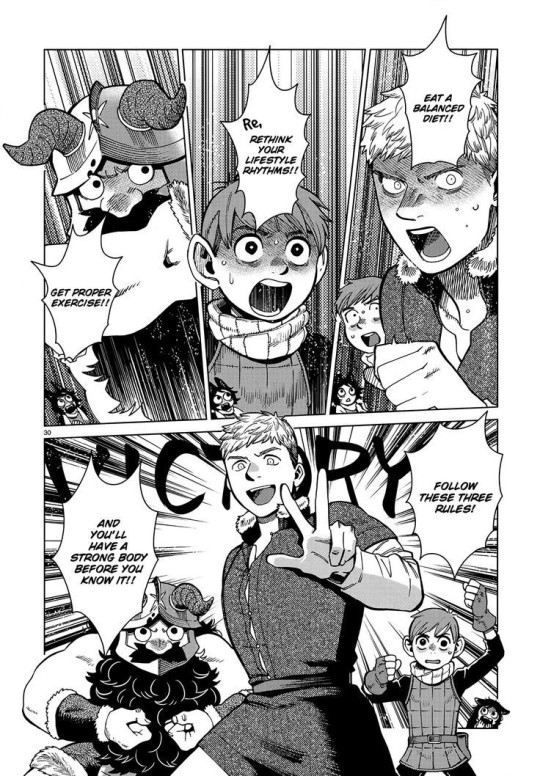
Kui tells us living things should strive to remain alive, no matter how difficult living may be sometimes, because taking part in life is inherently valuable. All joy and happiness comes from being alive and sharing that precious, limited life with the people around you, and knowing that happiness is finite and must be savored.
Dungeon Meshi tells us souls exist, but never tells us where they go or what happens after death. I think this is very intentional, because Kui doesn’t want readers to think that the characters can just give up and be happy in their next life, or in an afterlife.
There is resurrection in Dungeon Meshi, but thematically there are really no true “second chances.” Although in-universe society views revival as an unambiguous good and moral imperative, Kui repeatedly reminds us of its unnatural and dangerous nature. Although reviving Falin is a central goal of the story, it is only when Laios and Marcille are able to let go of her that the revival finally works… And after the manga’s ending, Kui tells us Falin leaves Laios and Marcille behind to travel the world alone, which essentially makes her dead to them anyway, since she is absent from their lives.
At the same time, Kui tells us that trying to prevent death, or avoid all suffering and loss is a foolish quest that will never end in happiness, because loss and suffering are inevitable and must someday be endured as part of the cycle of life. Happiness cannot exist without suffering, just like the joy of eating requires the existence of hunger, and even starvation.
Kui equates eating with desire itself, using it as a metaphor to describe anything a living creature might want, Kui also views the literal act of eating as the deepest, most fundamental desire of a living thing, the desire that all other desires are built on top of. If a living thing doesn’t eat, it will not have the energy necessary to engage with any other part of life. Toshiro, Mithrun, and Kabru are all examples of this in the story: They don’t take care of themselves and they actively avoid eating, and as a result they suffer from weakness, and struggle to realize their other desires.
Kui suggests that the key difference between being alive or dead is whether or not someone experiences desire. If you are alive, even if you feel empty and cannot identify your desires like Mithrun, you still have desires because you would be dead without them. The living body desires to breathe, to eat, to sleep, even if a person has become numb, or rejected those desires either to punish themselves, or out of a lack of self-love.
Sometimes, we have to do things which are painful and unpleasant, in order to enjoy the good things that make us happy. I believe Kui is telling us that giving up, falling into despair, and refusing to participate in life is not a viable solution either.
The demon only learns to experience desire by entering into and existing in the material, finite world. This experience intoxicates the demon, and it becomes addicted to feeling both the suffering of desire, and the satisfaction of having it fulfilled. This unnatural situation is what endangers the Dungeon Meshi world, and it’s only by purging the demon of this ability to desire that the world can be saved. The demon is like a corrupted Buddha that must give up its desires in order to return to the peaceful existence it had before it was corrupted.
The demon curses Laios to never achieve his greatest desires at the end of the manga, which manifests in several ways, such as losing his monstrous form, Falin choosing to leave after she’s revived, and being unable to get close to monsters because they are afraid of him. In some ways you could compare Laios to a Bodhisattva, a person who tries to aid others in finding nirvana/moksha, even if it prolongs their own suffering and prevents them from finding personal release. Laios gives the demon peace, but Laios himself will never be able to satisfy his desires, and must eventually come to accept his loss and move on with his life.
(This is an excerpt from Chapter 3 of my Real World Cultural and Linguistic influences in Dungeon Meshi essay.)
#dungeon meshi#delicious in dungeon#the winged lion#dungeon meshi spoilers#laios touden#mithrun of the house of kerensil#analysis#The Essay#After all the conversation about Mithrun I felt it was really important to drop this excerpt today
158 notes
·
View notes